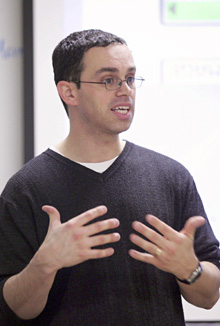Testing expert deplores ‘teaching to the test’

Louis Volante
Photo by Andrew Dobrowolskyj
Animated, dynamic, passionate about his subject, Louis Volante comes across as the kind of teacher one remembers warmly years after graduation.
He arrived at Concordia last summer as an assistant professor of education. He has taught at the Ontario Institute for Studies in Education at the University of Toronto, where he obtained his PhD, and also at Ryerson University and the University of Hawaii.
His research is focused on educational evaluation and assessment, and he talks about it in everyday language, avoiding jargon.
“I try, even in my academic writing, to use the clearest, most accessible language possible,” he said in an interview. “I want my work to be read not just by academic colleagues but by those affected in practice: teachers, legislators and the public.”
Volante’s most recent article outlines his ideas on the use and abuse of standardized tests. “Teaching to the test: What every educator and policy-maker should know” was published in the Canadian Journal of Educational Administration and Policy.
He describes the corrupting effect of what he calls “high-stakes” standardized testing. There are jurisdictions in the United States where schools receive merit-based financing. If their students do well, as measured by standardized tests, the schools benefit monetarily.
The result sometimes is “teaching to the test,” where teachers spend too much time preparing students for the test rather than simply covering the curriculum. Volante also reports instances where teachers or administrators have given students the answers to boost scores because so much depends on them.
The use of such tests is a growing phenomenon in Canada as well. Standardized test results are snapshots, but they can distract public attention from a three-dimensional view of a student’s performance.
For example, in language arts, reading and writing are typically measured, “but a well-rounded literacy program also includes speaking and listening components, which are usually not part of these tests.” To design, administer and evaluate tests measuring all four parameters would substantially increase their cost, and duplicate the ongoing evaluation of students by teachers.
Volante developed assessment guidelines for the Grade 10 Literacy Test, now a graduation requirement for secondary students in Ontario. Unfortunately, many students fail the test despite repeated attempts.
“Ontario may be forced to issue special diplomas for those who have met all other graduation requirements but just can’t pass these tests, because without a high school diploma, students cannot continue their education” even in trade and technical schools.
There are two models for standardized tests. Norm-referenced tests create bell curve distributions of the scores of those writing them, against which each student is ranked. This competitive model results in many failures by definition, since half the students will always be below average.
Volante much prefers criterion-referenced tests, where student performance is measured against pre-set standard for success; using this model, it is at least possible for each student to pass.
Testing may help identify student strengths and weaknesses, but it is frequently misused to track school performance. Volante deplores the annual “report cards” published by the Fraser Institute because schools are ranked against one another, meaning there will always be lots of “failures.”
“Since we know that the single greatest predictor of student performance is the student’s socio-economic background, how does it help a poor family on one side of the city to be told that the ‘best school’ is located at the other end?”
What standardized tests usually “reveal” is the superior performance of “private” schools.
In Quebec, nearly all private schools actually receive large government subsidies. Volante subscribes to the notion that every dollar taken from the public system weakens it. “Why, as a society, if we won’t support two-tier health care, do we support two-tier education?”